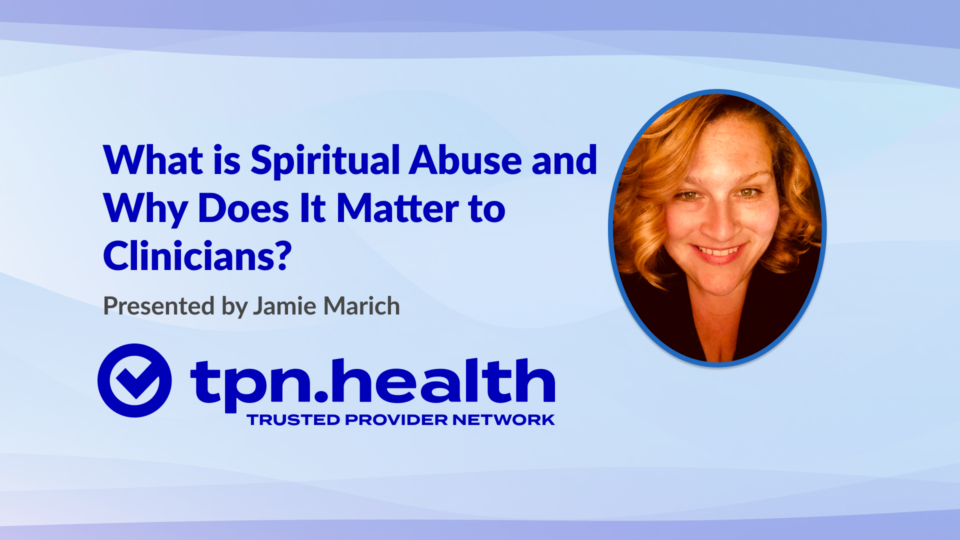
What is Spiritual Abuse and Why Does It Matter to Clinicians?
Information
Recorded
-
-
Learning Objectives
Participants will be able to:
-
Define spiritual abuse from a pastoral, developmental, and clinical perspective.
-
Explain spiritual abuse within the context of the AIP model.
-
Describe 2 ways spiritual abuse affects identity development in clients especially when oppressive cognitions imparted by state or societal factors are at play.
-
Identify 3 common themes amongst religious denominations and spiritual practices that have led to abuse experiences in individual.
Educational Goal
The educational goal of this workshop is to familiarize clinical professionals with the concept of spiritual abuse and to begin recognizing how it shows up in clinical presentation
Description
Generally defined as the use of God or religion as tools to gain power and control by the abuser, spiritual abuse is one of the most overlooked forms of abuse in clinical settings. However, the willingness to address it will give clinicians added insight into many of their clients and how to more effectively and holistically address treatment. Spiritual abuse is not just relevant for those who have been members of cults, it is a very real condition that often occurs in individuals who have been abused, or who struggle with addiction issues. The aim of this presentation is not to single out any one group; rather, to examine common themes of power, control, and shaming/manipulation that exists across religions and spiritual practices.
Target Audience
- Counselor
- Marriage & Family Therapist
- Psychologist
- Social Worker
- Substance Use Disorder Professionals
Presenters

Dr. Jamie Marich (she/they/we) began her career as a humanitarian aid worker in Bosnia-Hercegovina from 2000-2003, primarily teaching English and music. Jamie travels internationally teaching on topics related to trauma, EMDR therapy, expressive arts, mindfulness, and yoga, while maintaining a private practice and online education operations in her home base of Akron, OH. Marich is the founder of the Institute for Creative Mindfulness and the developer of the Dancing Mindfulness approach to expressive arts therapy. Marich is the author of EMDR Made Simple: 4 Approaches for Using EMDR with Every Client (2011), Trauma and the Twelve Steps: A Complete Guide for Recovery Enhancement (2012), Creative Mindfulness (2013), Trauma Made Simple: Competencies in Assessment, Treatment, and Working with Survivors, Dancing Mindfulness: A Creative Path to Healing and Transformation (2015), and Process Not Perfection: Expressive Arts Solutions for Trauma Recovery (2019). Marich co-authored EMDR Therapy & Mindfulness for Trauma-Focused Care along with colleague Dr. Stephen Dansiger in 2018, and their new book with Springer Publishing Healing Addiction with EMDR Therapy: A Trauma-Focused Guide released in 2021. North Atlantic Books published a revised and expanded edition of Trauma and the 12 Steps in the Summer of 2020, and they released The Healing Power of Jiu-Jitsu: A Guide to Transforming Trauma and Facilitating Recovery in 2022. Her latest release with North Atlantic Book, Dissociation Made Simple: A Stigma-Free Guide to Embracing Your Dissociative Mind and Navigating Life came out in January 2023. She has three more projects in the works with North Atlantic Books, including her personal memoir about surviving spiritual abuse called You Lied to Me About God, due out in Autumn 2024.
The New York Times featured Marich’s writing and work on Dancing Mindfulness in 2017 and 2020. NALGAP: The Association of Gay, Lesbian, Bisexual, Transgender Addiction Professionals and Their Allies awarded Jamie with their esteemed President’s Award in 2015 for her work as an LGBT advocate. The EMDR International Association (EMDRIA) granted Jamie the 2019 Advocacy in EMDR Award for her using her public platform in media and in the addiction field to advance awareness about EMDR therapy and to reduce stigma around mental health. The Huffington Post published her personal story of being out as a clinical professional with a dissociative disorder in May 2023.
Financially Sponsored By
- TPN.health
- Institute for Creative Mindfulness